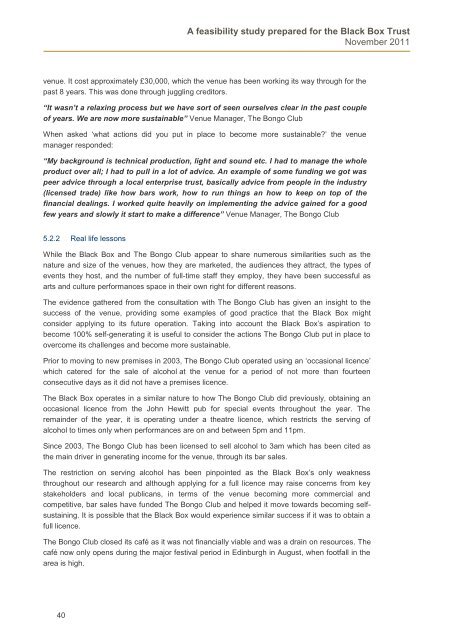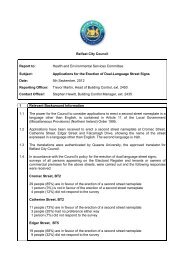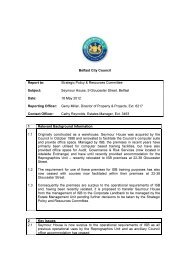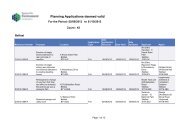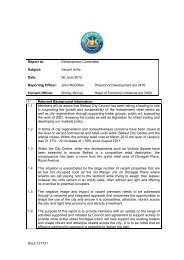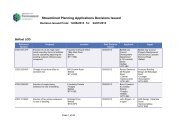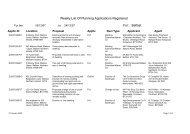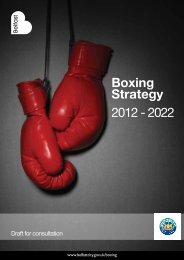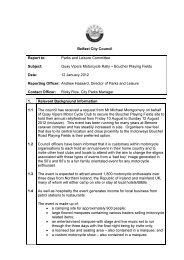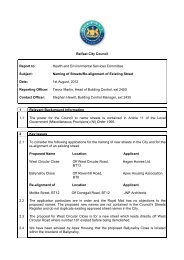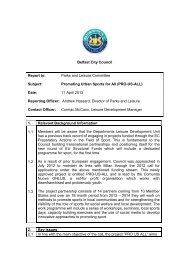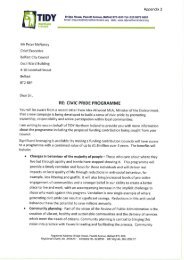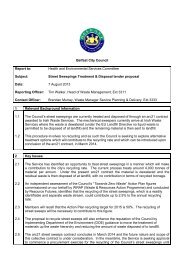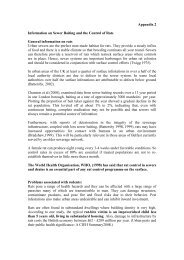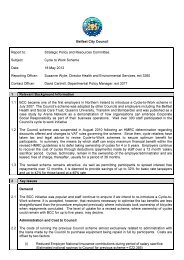A feasibility study prepared for the Black Box TrustNovember 2011venue. It cost approximately £30,000, which the venue has been working its way through for thepast 8 years. This was done through juggling creditors.“It wasn‟t a relaxing process but we have sort of seen ourselves clear in the past coupleof years. We are now more sustainable” Venue Manager, The Bongo ClubWhen asked „what actions did you put in place to become more sustainable?‟ the venuemanager responded:“My background is technical production, light <strong>and</strong> sound etc. I had to manage the wholeproduct over all; I had to pull in a lot of advice. An example of some funding we got waspeer advice through a local enterprise trust, basically advice from people in the industry(licensed trade) like how bars work, how to run things an how to keep on top of thefinancial dealings. I worked quite heavily on implementing the advice gained for a goodfew years <strong>and</strong> slowly it start to make a difference” Venue Manager, The Bongo Club5.2.2 Real life lessonsWhile the Black Box <strong>and</strong> The Bongo Club appear to share numerous similarities such as thenature <strong>and</strong> size of the venues, how they are marketed, the audiences they attract, the types ofevents they host, <strong>and</strong> the number of full-time staff they employ, they have been successful asarts <strong>and</strong> culture performances space in their own right for different reasons.The evidence gathered from the consultation with The Bongo Club has given an insight to thesuccess of the venue, providing some examples of good practice that the Black Box mightconsider applying to its future operation. Taking into account the Black Box‟s aspiration tobecome 100% self-generating it is useful to consider the actions The Bongo Club put in place toovercome its challenges <strong>and</strong> become more sustainable.Prior to moving to new premises in 2003, The Bongo Club operated using an „occasional licence‟which catered for the sale of alcohol at the venue for a period of not more than fourteenconsecutive days as it did not have a premises licence.The Black Box operates in a similar nature to how The Bongo Club did previously, obtaining anoccasional licence from the John Hewitt pub for special events throughout the year. Theremainder of the year, it is operating under a theatre licence, which restricts the serving ofalcohol to times only when performances are on <strong>and</strong> between 5pm <strong>and</strong> 11pm.Since 2003, The Bongo Club has been licensed to sell alcohol to 3am which has been cited asthe main driver in generating income for the venue, through its bar sales.The restriction on serving alcohol has been pinpointed as the Black Box‟s only weaknessthroughout our research <strong>and</strong> although applying for a full licence may raise concerns from keystakeholders <strong>and</strong> local publicans, in terms of the venue becoming more commercial <strong>and</strong>competitive, bar sales have funded The Bongo Club <strong>and</strong> helped it move towards becoming selfsustaining.It is possible that the Black Box would experience similar success if it was to obtain afull licence.The Bongo Club closed its café as it was not financially viable <strong>and</strong> was a drain on resources. Thecafé now only opens during the major festival period in Edinburgh in August, when footfall in thearea is high.40
A feasibility study prepared for the Black Box TrustNovember 2011The Black Box also closed its café for the same reasons as The Bongo Club, which was as aresult of a lack in passing trade <strong>and</strong> local competition. Although, the closure of the café onlyapplied to daytime trading hours, still operating each week Thursday to Saturday 5pm to 11pm. Itis only open during the day over the twenty-five days of January for the Out to Lunch Festival, asimilar basis to that of The Bongo Club during its busy festival time.The decision by both venues to close their cafes <strong>and</strong> operate them only on temporary orperiodical terms seems to have worked well for both parties. Some may argue that the BlackBox‟s decision to close the café during the day is a wasted opportunity in generating additionalincome, however given the experience of The Bongo Club as a similar arts <strong>and</strong> culture venue<strong>and</strong> the lack of footfall in the Cathedral Quarter during the day, it makes sense for the Black Boxto only open the café on a temporary basis or when there are particular performances or festivalson to draw people in.The Bongo Club rent their building from Edinburgh University, which was previously theuniversity‟s student union. The terms of the lease were provided at a reasonable rate of £50,000per annum to The Bongo Club on the basis of its charitable aims as the trading arm of an arts<strong>and</strong> education charity. Whereas, the Black Box currently pays a rate of £70,000 per annum to aprivate l<strong>and</strong>lord, which they recently tried to negotiate downwards, however no agreement tolower the rent could be reached.Plans for the University of Ulster‟s Jordanstown campus to move to a new l<strong>and</strong>mark building inthe Cathedral Quarter are expected to make “a major contribution to the economic <strong>and</strong>cultural regeneration of the city‟s north side, including the Cathedral Quarter, injectingvitality <strong>and</strong> energy into this important part of the city. This plan will help transform theCathedral Quarter <strong>and</strong> surrounding areas into a dynamic cultural, creative <strong>and</strong> educationaldestination” Professor Richard Barnett, Vice Chancellor, University of UlsterAs a popular venue for „‟students <strong>and</strong> singles‟ <strong>and</strong> its involvement in the development of the city‟snorth side as a place to socialise <strong>and</strong> enjoy the arts <strong>and</strong> culture, the Black Box could explorewhether the university would be interested in supporting the venue‟s operation going forward, ,connecting education to arts, culture <strong>and</strong> creativity.The Bongo Club have a peak <strong>and</strong> off-peak pricing structure in place, whereby they charge higherprices for evenings <strong>and</strong> weekends. Although the rates it charges would not be applicable to theBlack Box, as it is a slightly larger venue with a full licence, the Black Box ManagementCommittee could review the current pricing structure <strong>and</strong> adopt The Bongo Club‟s concept ofcharging slightly higher prices for renting spaces. At weekends an uplift in charges could beintroduced without diminishing one of its key strengths as being „reasonable‟ <strong>and</strong> „affordable‟.The Bongo Club sought funding for training <strong>and</strong> advice from industry experts. Its venue managerthen applied the knowledge he had gained to the operation of the venue which has helpedsignificantly in terms of becoming more sustainable.Having the right skills set is the key to the success of any business. The Black Box has alreadytaken steps to gain advice regarding finance <strong>and</strong> moving towards sustainability by inviting twonew members with experience in both fields to the Management Committee of the venue. Inaddition the Board might wish to consider providing training for staff in financial management,ultimately moving towards developing a sustainable business plan.Consulting with The Bongo Club regarding its funding, organisational structure <strong>and</strong> operation hasdeepened our underst<strong>and</strong>ing of the challenges that other arts <strong>and</strong> culture performance spaces,41


